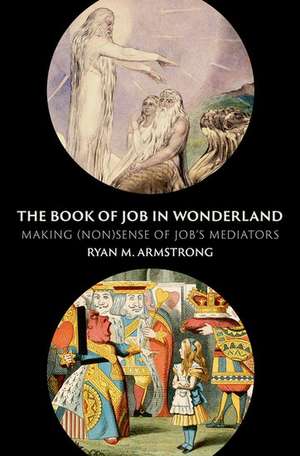The Book of Job in Wonderland: Making (Non)Sense of Job's Mediators
Autor Ryan M. Armstrongen Limba Engleză Hardback – 19 dec 2024
Preț: 156.28 lei
Preț vechi: 178.53 lei
-12% Nou
Puncte Express: 234
Preț estimativ în valută:
29.91€ • 32.50$ • 25.14£
29.91€ • 32.50$ • 25.14£
Carte disponibilă
Livrare economică 20-26 martie
Preluare comenzi: 021 569.72.76
Specificații
ISBN-13: 9780197763674
ISBN-10: 0197763677
Pagini: 248
Ilustrații: 10 b/w halftones
Dimensiuni: 157 x 226 x 25 mm
Greutate: 0.5 kg
Editura: Oxford University Press
Colecția OUP USA
Locul publicării:New York, United States
ISBN-10: 0197763677
Pagini: 248
Ilustrații: 10 b/w halftones
Dimensiuni: 157 x 226 x 25 mm
Greutate: 0.5 kg
Editura: Oxford University Press
Colecția OUP USA
Locul publicării:New York, United States
Recenzii
This is the most creative and insightful study of the Elihu speeches in the Book of Job that I have read. It combines careful and rigorous philological analysis, attention to the history of reception among Jewish and Christian interpreters, and literary theory to offer a fresh reading of the material. It is also beautifully written and truly engaging to read. A tour de force.
There are many faces to mediation between Job and the Deity in the book of Job. In this original and fascinating book, Ryan Armstrong examines them all, employing a rich array of philological and literary-rhetorical means to do so. Armstrong impresses us with the intermediary contributions of Elihu at the same time that he addresses the Deity's astonishingly unmediated response to Job. Armstrong makes profound use of interpretations of Job stretching from ancient to contemporary times, with extended and delightful comparisons drawn to Lewis Carroll's Alice in Wonderland. Engagingly written, this marvelously sophisticated and learned treatment of an endlessly engaging text is essential reading for every student of Job.
Ryan Armstrong draws productively on the work of Lewis Carroll to offer a detailed, authoritative, and highly insightful exploration of the Book of Job. In so doing, he sheds fascinating light on topics ranging from social justice to language, wisdom and learning in the Carrollian oeuvre. Compellingly written - at times via some delicious neologisms of his own - this volume delivers on the promise of any comparative exercise which, in the words of George Steiner, is to 'see more'.
The Book of Job in Wonderland quickly captured my heart and attention. If you're a Bible teacher or preacher, you should snatch up a copy posthaste!
There are many faces to mediation between Job and the Deity in the book of Job. In this original and fascinating book, Ryan Armstrong examines them all, employing a rich array of philological and literary-rhetorical means to do so. Armstrong impresses us with the intermediary contributions of Elihu at the same time that he addresses the Deity's astonishingly unmediated response to Job. Armstrong makes profound use of interpretations of Job stretching from ancient to contemporary times, with extended and delightful comparisons drawn to Lewis Carroll's Alice in Wonderland. Engagingly written, this marvelously sophisticated and learned treatment of an endlessly engaging text is essential reading for every student of Job.
Ryan Armstrong draws productively on the work of Lewis Carroll to offer a detailed, authoritative, and highly insightful exploration of the Book of Job. In so doing, he sheds fascinating light on topics ranging from social justice to language, wisdom and learning in the Carrollian oeuvre. Compellingly written - at times via some delicious neologisms of his own - this volume delivers on the promise of any comparative exercise which, in the words of George Steiner, is to 'see more'.
The Book of Job in Wonderland quickly captured my heart and attention. If you're a Bible teacher or preacher, you should snatch up a copy posthaste!
Notă biografică
Ryan M. Armstrong is Visiting Assistant Professor of Hebrew Bible at Oklahoma State University. His research focuses on ancient Hebrew literature within its linguistic and historical context and its impact on interpreters throughout history.
